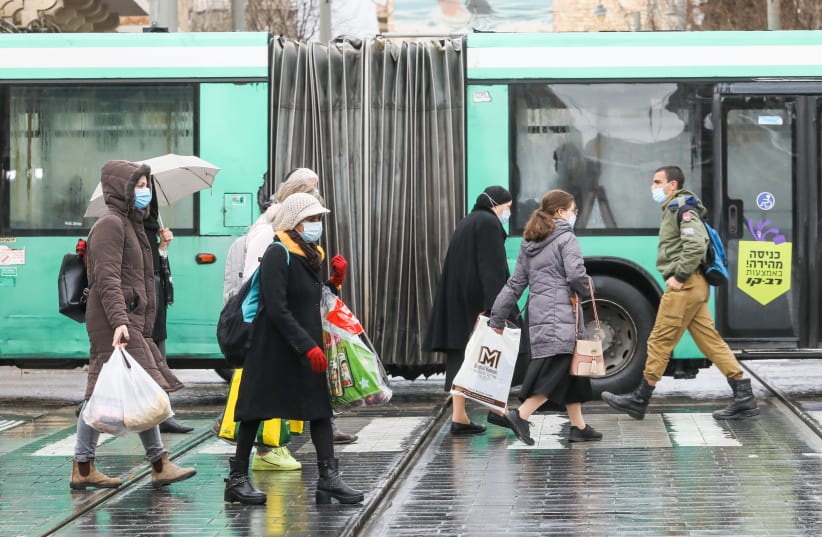Extending the reinforced lockdown and the closure of Israel’s borders is both necessary and inevitable, several experts have told The Jerusalem Post ahead of the cabinet meeting that is set to discuss the issue on Thursday.
While the numbers afflicted by the pandemic appear to have started trending downward, the situation is still too severe to lift restrictions, especially in light of the unprecedented pressure on the health system.
“Our hospital system is on the verge of overcapacity,” Zeev Feldman, director of the department of pediatric neurosurgery at Sheba Medical Center and chairman of the World Fellowship of the Israeli Medical Association, explained to the Post. “We are witnessing ambulances forced to wait up to six hours before evacuating the sick. I have been touring hospitals and the situation is very bad.
“The number of patients is overwhelming. It would be irresponsible to lift the lockdown before it goes down more,” he added.
Feldman stressed that the number of patients in serious condition should decrease to less than 400 from the current 1,200.
“People who say that the lockdown has other negative effects, including on health issues, are correct – but at this moment we are dealing with a question of life and death. Close to 5,000 people have died from corona in Israel: We should fight to avoid reaching 6,000 deaths.
“We must protect our health system; we have not done it enough so far,” he concluded.
Dr. Jacob Haviv, Herzog Medical Center’s medical director, shared the experience at his institution.
“We have been operating over 100% of our capacity for over two weeks. Every day some 15 patients recover and leave, and the same number is hospitalized,” he said.
Herzog opened a new corona ward on Wednesday, fulfilling a request from the Health Ministry.
Haviv also insisted that it is necessary to maintain the current restrictions.
“When we lifted the first lockdown, there were a few dozen new cases every day; when we lifted the second one, there were a few hundred. Now we are talking about some 7,000 or 8,000. I had hoped that by now the cases would have dropped below 1,000, but it has not happened,” he lamented.
“With another week or 10 days of lockdown, things might improve,” he said.
Prof. Cyrille Cohen, vice dean at Bar-Ilan University’s Faculty of Life Sciences, also expressed disappointment at the fact that a more significant reduction in numbers has yet to happen.
“We are very disappointed with the effect of this lockdown. We have seen a stabilization of the cases, but not a decrease. As of now, we know that the reproduction rate is below 1, which means that the pandemic is contained, but the numbers are still so high that if we open up, it is going to be as if we did nothing,” he explained.
“We must consider that we are dealing with new variants of the virus,” he added. “The British variant in Israel seems to be responsible for at least 60% of the infections. The data that come from the UK tell us that the variant can also increase mortality. If we take all of this into account, there is a lot of uncertainty – and therefore this is not the time to end the lockdown.”
He pointed out that when the lockdown is lifted, the priority should be to reopen the education system, starting with daycares and preschools – also because the data suggest that there are fewer infections in those age groups – but even for that, the government should wait.
“I’m hoping that soon we will see the effect of the vaccination campaign, and that, together with a few more days of lockdown, this will bring us some good surprises,” Cohen said. “But I honestly have to confess that I would not have thought that at this point we were going to be in this situation.”
While before the spread of the variants, the professor explained, herd immunity might have been reached with 60% or 70% of the population inoculated, with the variants it may require around 80% or 85%, and therefore a longer time.
Eventually, the crucial data we need in order to decide on lockdown policies will be whether those who are vaccinated can still infect others, he said in conclusion, but it will take another few months to have this information.
